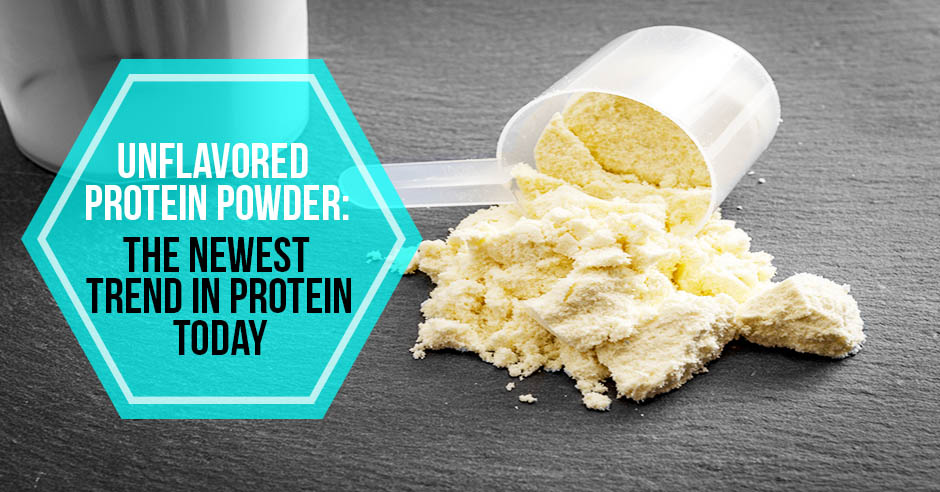Protein powders have long been used by athletes to curb hunger, build muscle, and increase performance.
However, non-athletes and bodybuilders are beginning to use protein powders in their daily diets and for good reason -- according to the Center for Disease Control (CDC), only 15.5% of a woman's daily calorie intake is protein, and for men, it's just half a percent higher. WebMD, on the other hand, recommends that protein consumption should be up to 35% total calories.
This means that people are beginning to recognize that their protein intake isn't quite high enough to meet their overall dietary needs and are beginning to use supplemental protein powder to reach their daily protein goals.
But what protein powders are they choosing? Vanilla? Chocolate? Strawberry? Not necessarily.
Today's consumers are actually looking for a protein powder isolate that is much more versatile -- unflavored.
Aren't Unflavored Protein Powders for Medical Use?
When unflavored protein powder isolates first came out on the market, they were largely used for medical purposes.
For example, if a man became ill and could no longer eat well, unflavored protein powder could be mixed in with applesauce, milk, mashed potatoes, and in some cases, even water.
This would allow the man increase calorie and protein intake even though his eating habits had changed with his illness.
Using protein powder isolates in this manner decreases the likelihood or slows down the process of losing muscle tone, dropping weight, and becoming weak.
For this reason, unflavored protein powders are excellent for the medical community.But they're not necessarily reserved just for the medical community.
Athletes and non-athletes alike can use unflavored protein powder in many more ways than traditional powders to achieve their dietary, fitness, and wellness goals.
Does Unflavored Protein Powder Have a Taste?
Surprisingly, most unflavored protein powders do not taste like much of anything.
While you're likely to notice some taste and texture when mixed with water, most people don't do this simply because there's no protein powder on the market today that is unnoticeable in water.
However, when mixed with just about anything else -- from juice to soup -- protein powder generally cannot be detected.
This means that unflavored protein powder has greatversatility, which is perfect for today's busy lifestyles.
Flavored protein powders, including chocolate, vanilla, strawberry, and even fun flavors like butter pecan, can typically only be made into shakes.Flavored protein may be able to be mixed into brownies or cakes, however, this negates its healthiness.
How Consumers Use Unflavored Protein Powder
Today's social media websites like Facebook and Pinterest play a significant role in what people are eating.
Recipes are abound on social media sites in both video and photo form, and finding recipes this way is surpassing using traditional cookbooks.
Some of the most popular online recipes are those for creative smoothies and shakes.
Not just a chocolate or strawberry smoothie, but a blueberry muffin flavored smoothie. A banana nut bread smoothie, a cheesecake flavored smoothie, or a delicious greens smoothie. The possibilities are absolutely endless, but a smoothie just isn't a good meal replacement without some protein in it.
Unflavored protein powder can be used to boost the protein content in just about any smoothie.
Consumers can get as creative as they want with their smoothie flavors and by using whole fruits, low calorie milk and milk replacements, and other wholesome ingredients, even a smoothie that sounds like a dessert can be a healthy breakfast or snack option.
Even individuals who are not experiencing illness are beginning to use unflavored protein powder in a variety of ways.
A vegan woman may use unflavored pea protein in a quinoa dish to ensure that her body is getting enough protein without animal products, while a mother may sneak a bit of protein powder into her toddler's favorite juice to ensure that he's getting the nutrients he needs to grow.
Are You Offering Unflavored Next to Your Flavored Powders?
Many supplement brands already have flavored protein powders as a part of their product lineup and for good reason. Athletes and bodybuilderswill likely always gravitate towards the large cans of chocolate and vanilla protein with photos of lean, well muscled men and women on the front.
However, by adding an unflavored variety to your lineup, you can capture the business of non-athletes who are looking to increase their protein intake with something versatile enough to be used in anything.
Two Types of Protein
Consider offering two different types of unflavored protein in your supplement lineup.
Most powders are made from bulk unflavored whey protein, which is a derivative of milk. While whey typically does not bother lactose-intolerant people, some people choose to steer clear of whey based protein and choose vegan plant proteins.
Plant proteins are a bit harder to mask in smoothies and other foods, but they work well for many people who desire to avoid milk based products.
Whey protein, on the other hand, is more easily dissolved and has less flavor than plant proteins, making it usable and enjoyable in almost anything.
In order to ensure that you're capturing the business of all different types of protein powder users, offering both vegan and whey based unflavored protein powders will allow your consumers to continue boosting their protein intake in a way that works best for them.
By offering flavored and unflavored protein powders in all different varieties, you can have a complete protein powder lineup that gives consumers a vast number of options to choose from.
Ensure Your Consumers Are Getting the Best
No matter what type of protein powder you're putting in your product lineup, it's important that you ensure the ingredients are healthy, wholesome, and free from unwanted additives.
Consumers expect to pay between $20-$30 for a container of protein powder, unflavored or not, so don't skimp on great ingredients to lower the price point.
It is all about listening to your buyerrs. If your customer wants an unflavored whey protein isolate then you create that! Or even an organic unflavored whey protein, the customer is in charge.
Let your customers know that the protein powders your brand offers are of excellent quality and that they can trust they're getting only the best when they purchase your brand.





